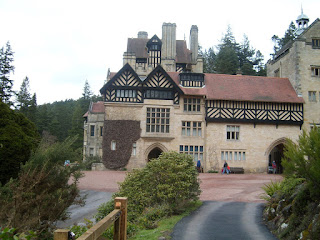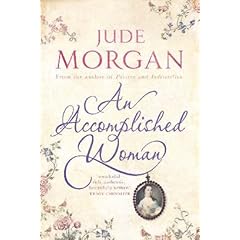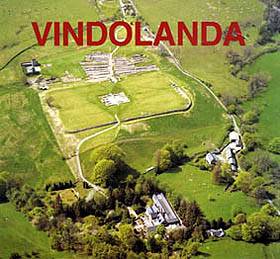 I'm not a big fan of crime novels but I do love Roman Britain, so I couldn't wait to get my mitts on Ruso and the Disappearing Dancing Girls by R. S. Downie, the first Medicus Investigation, when it came out in 2006 (as Medicus and the Disappearing Dancing Girls in the UK and Medicus in the USA). I was lucky enough to review it for the Historical Novels Review and here's what I wrote:
I'm not a big fan of crime novels but I do love Roman Britain, so I couldn't wait to get my mitts on Ruso and the Disappearing Dancing Girls by R. S. Downie, the first Medicus Investigation, when it came out in 2006 (as Medicus and the Disappearing Dancing Girls in the UK and Medicus in the USA). I was lucky enough to review it for the Historical Novels Review and here's what I wrote: Britannia, 117 AD. Having just joined the hospital staff at the Roman legionary fortress of Deva (Chester), world-weary surgeon Gaius Petreius Ruso examines the murdered corpse of a young woman dredged up from the river. Then a ‘barmaid’ goes missing from Merula’s establishment. If this indicates a serial killer at large, Ruso doesn’t want to know. Saddled with the debts of his dead father and home-improvements-obsessed stepmother in Gaul, he needs to finish writing his Concise Guide to Military First Aid and obtain a speedy promotion. But all he’s gained up to now is the useless, broken-armed slave-girl he impulsively rescued from a passing merchant.
So far, so Lindsey Davis, you might think. Perhaps, but this novel more than holds its own in the Roman detective stakes. Grounded in solid but unobtrusive historical knowledge, it has memorable characters, a satisfying mystery and a vivid sense of place. Downie also treats us to some inspired comic dialogue and a running joke showing the Roman military medical service as an NHS-in-microcosm, complete with bean-counting bureaucrats and literal-minded clerks. An engaging début, set fair to become a popular series.
 Ruso and the Demented Doctor
Ruso and the Demented Doctor (
Terra Incognita in the USA), the second in the series, came out in March and I'm delighted to report that it's even better than the first. Ruso and Tilla, now his housekeeper, accompany a detachment of the Twentieth Legion from Deva to Coria, a fort on the northern frontier near Tilla's tribal lands. Trouble naturally awaits: a Roman soldier has been murdered, the fort's doctor confesses (but he's as mad as a bucket of frogs), a sinister native with antlers on his head is making mischief - and the Governor is about to pay a visit. So Ruso the Reluctant is roped in to do his least favourite job, with no help from Tilla who's been reunited with various relatives - and an ex-boyfriend.
It's a good, complex mystery tantalisingly played out, but what makes it shine, for me, are the characters and the setting. Coria (modern Corbridge) is a frontier fort with a shanty town attached. Here live the garrison 'wives' and girlfriends, merchants on the make and natives who are beginning to see that the Empire might have something to offer them after all. The interactions between conquerors and conquered are handled in a way that makes them both true to their time and real to us across all the centuries that separate us. And Downie is skilled at showing us the texture of her characters' lives and circumstances. Mainly they rub along together, Roman and native, but when those Britons who haven't come in from the cold get rebellious, everybody gets the shivers.
Ruso, wry, humane and recently divorced, who can't get far enough away from his troublesome family in Gaul and Tilla, torn between Ruso and her tribal loyalty, are shaping up to be a great double act in both head and heart. And each of them has an intriguing past that's being gradually revealed. I for one can't wait to meet Ruso's stepmother, Arria!
R. S. Downie (Ruth Downie in the USA) has a
blog (wherein, amongst other things, she explains the Mystery of the Confusing Titles and Author Names). And here's an interview I did with her in 2006 for the
Historical Novels Review:
INTRODUCING RUSO, THE RELUCTANT ROMAN GUMSANDAL
Watch out: there’s a new Roman detective prowling the mean streets of Roman Britain in R S Downie’s first novel, Medicus and the Disappearing Dancing Girls. His name is Gaius Petreius Ruso and he’s a medical officer in the fortress of Deva (Chester), home of the Twentieth Legion. Round about the time that Hadrian succeeds Trajan, he reluctantly turns detective when the drowned body of a young woman is brought to his hospital. Then, against his better judgment, he rescues a slave girl from her abusive owner. And that’s just the start.
The early chapters of the novel won Solander’s very first competition – for a romantic historical. So how did it turn into a crime novel?
‘To be honest I didn’t plan a thing,’ says Ruth. ‘The competition only asked for the first three chapters so I lifted some back-story from a novel I’d been trying to write for years, and cheerfully set up situations I had no clue how to resolve. I had no idea that people would suggest it was worth continuing. The shift to crime wasn’t something I had considered, but a publisher and an agent who showed interest both suggested it. There was then a long hiatus while I couldn’t see a way forward – until I read a book about the modern slave trade, and saw ancient parallels that I could work with.’
Ruth’s interest in Roman Britain was kindled when she read visited Hadrian’s Wall and read a tantalising caption in a museum: ‘Roman soldiers were not allowed to marry, but were allowed to have relationships with local women.’
‘There had to be a story there! As for the British aspect – it’s not hard for us to imagine being part of a wealthy and powerful society which wasn’t at ease with its own decadence, but the fascinating twist during the Roman period is that we weren’t the powerful ones. We were the colonised.’
For some years Ruth has been a regular volunteer at the Whitehall Villa excavations in Northamptonshire. When it comes to research into Roman times, she feels you can’t beat hands-on archaeology, as long as your characters don’t become as obsessed with pots as you do! ‘For me, the attraction of archaeology is that you’re looking at leftovers from the lives of ordinary people. You find pottery with the maker’s finger-marks in it, or an animal bone with a knife-cut across it that suggests it’s the remains of somebody’s dinner. That’s both inspiring and humbling. Those people must have had joys and worries that seemed overwhelmingly important at the time, and now they’re forgotten. Mind you, I often think that if they could see the loving care with which we excavate their rubbish, they would find it very funny.’
Ruth didn’t always want to be a novelist, but reading was an important part of her childhood. ‘My Dad was studying for a degree when I was small, and in the winter everyone wanted to be in the room with the paraffin heater – so reading, being a silent occupation, was keenly encouraged. I have a degree in English, the straight Beowulf to Virginia Woolf kind they gave you back in the days of handwritten essays and full grants. Afterwards I was too much of a wimp to teach – or do anything where you have to be brave or articulate – so I did a secretarial course. You learn a lot about organisations when you work at the bottom rather than the top, and being able to think and type at the same time has come in very handy.
‘I took Creative Writing evening classes about fifteen years ago to keep myself sane while studying double entry book-keeping. Some of us have met regularly ever since, and we’ve all learned from each other. Along the way there’s been the occasional published short story and travel article, some scripting work for a video production company, and a couple of practice novels best forgotten.’
Ruth has also won a BBC story competition judged by Fay Weldon. ‘Competitions are great’ she says, ‘because they give you a reason to write and you know you won’t get a rejection. If they don’t like your work it usually just disappears, as mine often has. However I was once lucky enough to get the Writers’ News Winner of Winners award. The occasional prize is not only encouraging but it also shows your family that you really are doing something useful at the PC and not just avoiding washing up.
‘I entered the BBC competition because my friends did, all trusting that there would be so many entries we would never have to be on TV. The day before filming I managed to injure my foot and spent the shoot hobbling around trying to keep the crutches out of sight. Fay Weldon was lovely and the BBC folk were kind and patient, but I’m definitely not destined for a career in television.
‘The BBC then decided there might be some mileage in a follow-up programme, and filmed the finalists talking about their writing. I could hardly say that I’d got stuck halfway through Medicus and was thinking of burning it and studying archaeology instead. So I said I was going to finish it. “Fine,” they said, “If the programme goes ahead we’ll come back next year and see how it’s going.” Having just failed a significant job interview, I had plenty of time. All through the winter I kept writing, quite unaware that the BBC had decided not to go ahead and they weren’t coming back at all. If I’d known that, I’d now be hunting for a job to fund an archaeology degree.’
One of the delights of Medicus is its wry, dry humour. I wondered if Ruth finds it easy to do humour that both appeals to the modern reader and rings true to what we know about the Roman sense of humour/satire etc? Did she research much about Roman humour? ‘Not as such, but many Roman writers were deeply gifted at insulting people and Pompeii had prolific graffiti scribblers. Humour is a dodgy business anyway – I wrote something I thought was extremely funny the other day and nobody noticed.’
She chose Chester as the setting for the first Medicus novel because she wanted a lively Army base. ‘When you walk through the centre of Chester you are actually walking the streets of the legionary fortress. It’s a wonderfully evocative place.’
The National Health Service, with its tortuous bureaucracy and officious officials, appears as a running satirical gag in the novel. Did her publishers want it changed for overseas readers? ‘No,’ says Ruth. ‘Nobody seemed to have a problem with it. I think similar situations occur in all big organisations. There are conflicting priorities, and there are people who worm their way into positions of power. Actually I have great sympathy for administrators – I used to work in Local Government finance – so maybe Priscus is playing out my megalomaniac fantasies.’
Ruth plans her novels before she starts to write – then she realises the plan is rubbish and rewrites it. Later she realises the novel is rubbish and goes back to redo the plan. And so on. She wishes she were a disciplined writer. ‘But I do worry regularly about writing – does that count?’
Finally, I ask Ruth which historical novelists have influenced her. ‘Lindsey Davis is of course the queen of the Roman whodunit, and discovering Falco was both a joy and a relief. My characters from the ancient world had been using modern dialogue and humour because that’s how people are, but until then I had wondered if it was really “allowed” in a historical novel. Bernard Cornwell, Simon Scarrow, Manda Scott and Robert Harris all combine convincing settings with a gripping story. But naming people is risky – I haven’t read all their books and I’ve probably left somebody out.’
 Recently at the Getty Villa in California, a discussion took place between Steven Saylor and Steven Pressfield on Historical Fiction: The Ancient World in Modern Literature. Here's a video presentation of it - and very interesting it is too, whether you're a reader or a writer (or both). Steven Saylor calls ancient historians like Livy the first historical novelists and explains why. Steven Pressfield maintains that while research is useful, it's often "the stuff you make up that's most convincing".
Recently at the Getty Villa in California, a discussion took place between Steven Saylor and Steven Pressfield on Historical Fiction: The Ancient World in Modern Literature. Here's a video presentation of it - and very interesting it is too, whether you're a reader or a writer (or both). Steven Saylor calls ancient historians like Livy the first historical novelists and explains why. Steven Pressfield maintains that while research is useful, it's often "the stuff you make up that's most convincing".














































